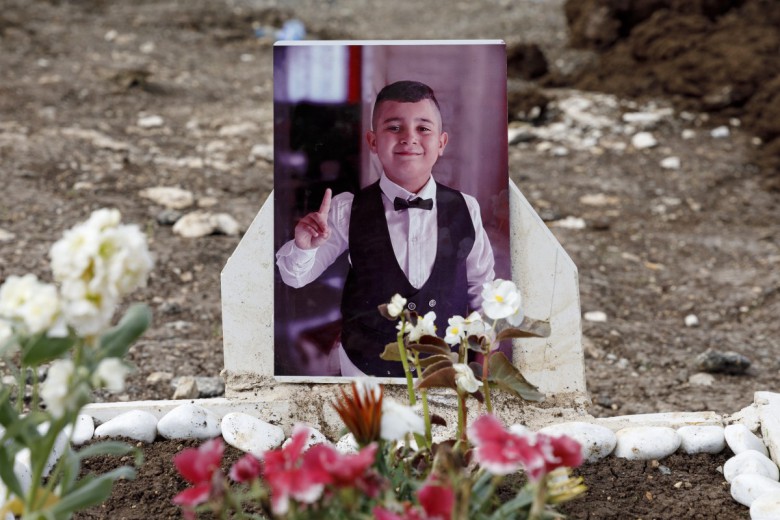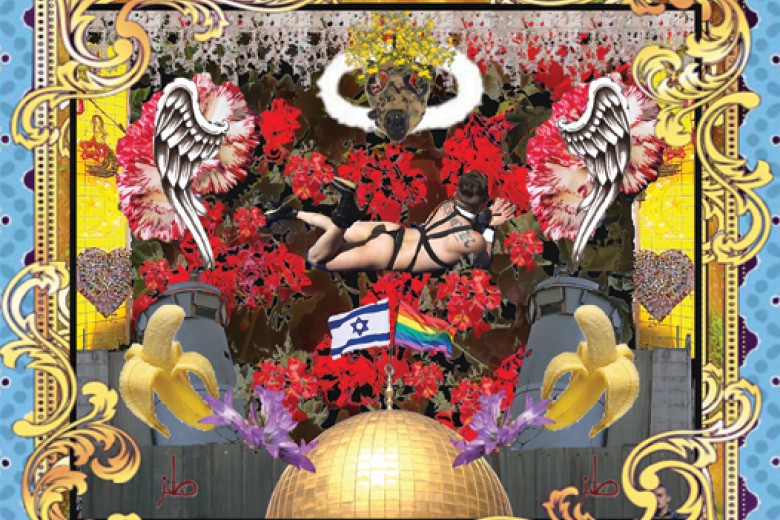In early November 2023, Indigenous, Jewish, and settler community members rolled out a nine-metre long piece of canvas in Churchill Square in Edmonton. The Gaza Health Ministry had recently released the names of nearly 7,000 Palestinians killed by Israel in one month alone. With the list in hand, community members wrote down the names and ages of those killed, inviting passers-by to pick a name and find a spot for it on the cloth. By the end of the day, the community had written down over 3,000 names, filling the nine-metre strip.
This action, and the care community members put into writing down each name, stands in stark contrast to how politicians and media have treated Palestinians killed during Israel’s ongoing siege of Gaza. While Justin Trudeau has tweeted about Hamas dozens of times, he hasn’t once tweeted about the more than 12,000 Palestinian children killed by Israel since October 2023. Where space is provided in media coverage for Israelis to be named and for readers to learn about their lives and their families, killed Palestinians are a number tacked onto the end of a sentence, like inconvenient context or unnecessary detail. Collateral damage in Israel’s war.
For the past several months, I’ve been thinking about what it means to protest the genocide and build the movement for Palestinian liberation in a political climate where live broadcasts from Gazans are worlds apart from the evening news and politicians’ statements, where speaking out against genocide has gotten dozens of people fired or disciplined, and pro-Palestine protests are smeared as “hate” and “violent.”
As poet and organizer Jody Chan writes in this issue’s parting shot, witnessing the genocide and politicians persistent denial of it is “crazy-making.” In a world where “a massacre and a Super Bowl are broadcast side by side,” madness isn’t the exception; to be Mad is “to refuse a reality in which such grotesque brutality is normalized.”
Canadian politicians and mainstream media are doing all they can to make us forget: forget the people massacred, forget that Israel is raining down bombs on Gaza, and forget that Canada is supplying Israel with arms to carry out this genocide. In writing down the names of Palestinians killed by Israel, Edmonton activists refuse to subscribe to this forgetting and to the normalization of a genocide. They refuse media coverage where killed Palestinians are a footnote, insisting on reporting that centres Gazans, not the Israeli government’s statements.
Much like this action, this issue of Briarpatch cuts through the noise of wishy-washy political statements and passive headlines, bringing clear-eyed strategies to build the movement.
Organizer T.Y. Kui investigates the so-called “anti-hate” police cracking down on Palestine solidarity protests and understanding anti-hate laws and policing as counter-insurgency, reminding organizers that another wing of the police will not keep us safe. Scholar Rinaldo Walcott looks to the leadership of anti-Zionist Jews who, in their insistence that the state of Israel does not make them safe but that they should be safe wherever they are, imagine a world beyond borders.
In our cover story, Palestinian journalist Zahraa Al-Akhrass writes about her years-long fight for fair coverage of Israel and Palestine in Global’s newsroom, recalling editorial decisions on Israel’s killing of Al Jazeera journalist Shireen Abu Akleh and calling out Canadian media’s fact-checking double-standard when it comes to Israeli sources versus Palestinian ones.
In the West Bank, photographer Rehab Nazzal documents how the Israeli occupation forces (IOF) is targeting and desecrating portraits of martyrs killed by Israel. As Nazzal writes, Palestinian memory and imagery are a direct threat to the Israeli state. After all, Gazans’ livestreams and photographs have shifted the world to a point of no return since October 2023, and the IOF knows this.
Despite mainstream media and the Canadian government manufacturing consent for the genocide, thousands of people are still taking to the streets to protest Zionism and demand Palestinian liberation. It’s not often that international news remains in the Canadian news cycle for six months, but national media continues to cover Israel’s brutality and politicians keep issuing statements on it because persistent demonstrations force them to.
In this sixth month of the genocide, we need to continue to refuse media and governments’ normalization of mass death and brutality and the silencing of voices in solidarity with Palestinians. Palestinian Youth Movement aptly summarized the task before us in October:
To the workers of the world and the unions that they lead: refuse to build or transport weapons destined for the Zionist entity. Take actions against complicit companies, end all material and social ties between your institutions and theirs. Organize sit-ins and direct actions, participate in mass protests and neighborhood canvasses, lead strikes and walkouts. When you strike, say why you are striking. Demand a ceasefire, demand an end to the siege and genocidal violence against Palestinians, and an end to Zionism—no more money, no more cover.
In solidarity,
Sophie Jin, Interim Editor
[email protected]


_1200_675_90_s_c1_.jpg)



_copy_780_520_s_c1.png)
